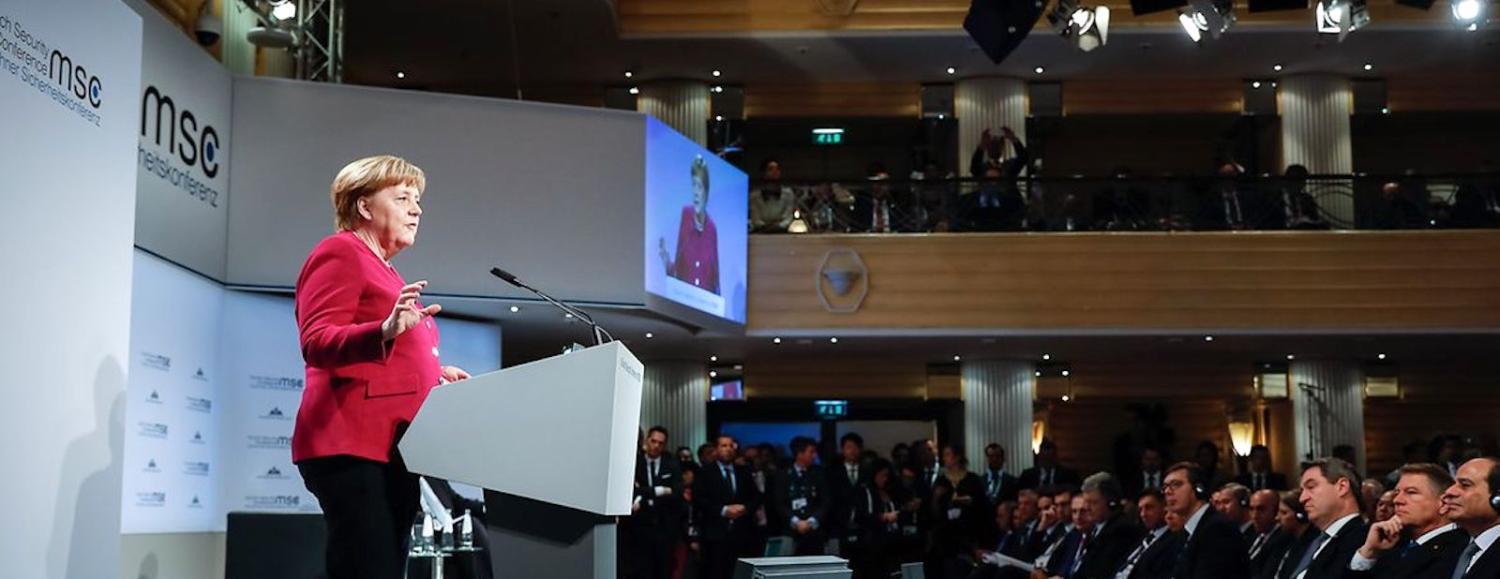Since 1963, the Munich Security Conference has been a fixture on the international scene. During the Cold War it was an important forum for debate on the West’s policy towards the Soviet Union. It was often described as a “transatlantic family meeting.”
Last weekend I attended the 2019 conference at the Hotel Bayerischer Hof, along with a couple of other Australians including former prime minister Malcolm Turnbull and Professor Rory Medcalf of the Australian National University.
Europeans seem not to understand that power is shifting away from them.
It was clear to everyone that the transatlantic family has big problems.
The attendance list sparkled. There were political leaders, policy-makers and princelings. Delegates included German Chancellor Angela Merkel, US Vice President Mike Pence, acting Defence Secretary Patrick Shanahan, first daughter Ivanka Trump and prince consort Jared Kushner, US House speaker Nancy Pelosi, former vice president Joe Biden, International Monetary Fund chief Christine Lagarde, Canadian Foreign Minister Chrystia Freeland, Russian Foreign Minister Sergei Lavrov, and many others.
The guest list was drawn mostly from Europe and North America – but it also included figures from further afield, for example, Yang Jiechi, the Chinese state counsellor for foreign policy, and Tarō Kōno, the Japanese Foreign Minister.
The United States always plays a leading role at the conference.
But this year, there were two Americas at Munich – one led by Pence and Ivanka, and the other by Biden and Pelosi.
Pence began by announcing “I bring greetings from the 45th president of the United States – President Donald Trump”, and waited for applause. None came.
Last year at the same conference former national security adviser H.R. McMaster told the crowd that evidence of Russian meddling in the 2016 US election was “incontrovertible.” Trump responded by slapping McMaster down on Twitter.
Determined not to make the same mistake, Pence hewed to his “America First” script and name-checked the President over 30 times in his speech. As one observer noted, Pence cited Trump more often than Yang Jiechi mentioned President Xi Jinping.
When he wasn’t talking about Trump, Pence was talking about Europe – and not in a good way. He called on the Europeans to withdraw from the Iran nuclear deal and admonished them for their defence spending. By contrast, he was comparatively gentle on Russia – the country that is trying to pull NATO apart.
Biden, on the other hand, gave an orthodox speech about American leadership. In 2019, it felt quaintly old-fashioned.
As the unofficial host, Angela Merkel delivered a spirited address defending multilateralism, and received several standing ovations. It’s funny how often leaders wait until they are halfway out the door before they say what they really think. (Senator Jeff Flake and other retiring Republicans come to mind.) Still, the world will miss Merkel.
The two interlopers at the family function, Russia and China, adopted different approaches. Sergei Lavrov’s tone was aggressive. He refused to take questions from Josh Rogin of the Washington Post on the grounds that he would misrepresent him. “Whatever I answer, you will write what you want, so do it”, he told the journalist. “Challenge accepted”, responded Rogin.
Lavrov refuses to answer my question about how Russia will prevent the Assad regime from threatening the region. Tells me: “Whatever I answer, you will write what you want, so do it.” Challenge accepted. #msc2019
— Josh Rogin (@joshrogin) February 16, 2019
For his part, Yang Jiechi preached a multilateralism that China does not practise. Unfortunately, most participants were too distracted by their family squabble to point out this humbug.
As always, Brexit was unavoidable. Former UK prime minister Tony Blair told us that Brexit was an historic mistake. It’s easy to criticise Blair, but I admire him for trying to prevent his country from committing a grave and pointless act of self-harm. Brexit will make Britain weaker and poorer. It will make the European Union smaller, less liberal, less outward-looking and less consequential.
Europeans seem not to understand that power is shifting away from them. Several European leaders were in attendance with their self-important entourages and armies of pushy bodyguards. But Europe matters much less than it once did; it will probably matter even less next year.
By the time of the next Munich Security Conference, the European Union will have lost some of its horsepower through Brexit, and the White House will probably still be occupied by an alliance unbeliever.
All families argue, but this felt different. One more year of this and we may be looking at divorce. The alternative suitors in Beijing and Moscow are not appealing.

